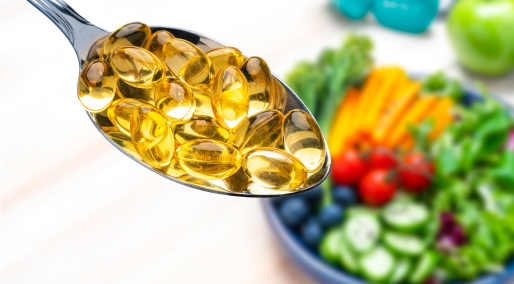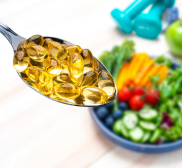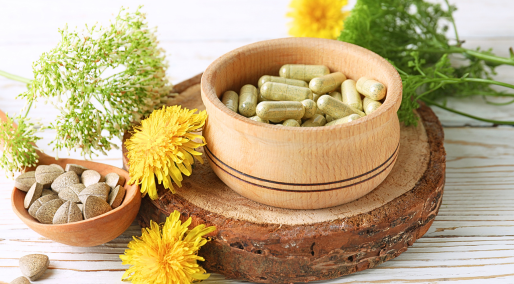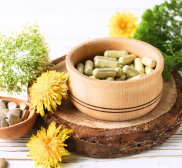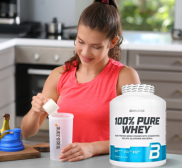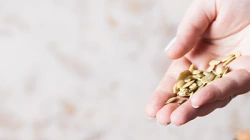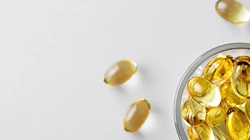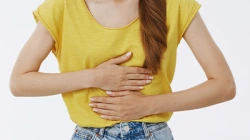.webp)
.webp)

Patryk Chodyniecki
Patryk Chodyniecki
Patryk Chodyniecki
Date Added: 29-07-2019
ACCELERATION OF PERISTALSIS AS A WAY TO IMPROVE INTESTINAL FUNCTION
Odżywianie jest jednym z podstawowych procesów życiowych, opierającym się na pozyskiwaniu przez organizm cennych składników odżywczych, zawartych m.in w pokarmie, które wpływają na pracę i rozwój naszego organizmu. Z odżywianiem, rzecz jasna, związany jest układ pokarmowy, którego prawidłowa praca, zapewnia prawidłowe funkcjonowanie całego organizmu człowieka. Trawienie pokarmów związane jest z perystaltyką, czyli ogólnie ujmując motoryką przewodu pokarmowego. Z przeprowadzonych badań wynika, że zaburzenia perystaltyki dotykają osoby w różnym wieku, albowiem przyśpieszona, ale również i leniwa praca jelit może silnie oddziaływać na jakość życia oraz codzienną aktywność. Wśród przyczyn wymienić można m.in. niewłaściwą dietę, infekcje czy wirusy układu pokarmowego oraz narażenie na toksyny i leki. Zaburzenia perystaltyki jelit prowadzą jednak do prostego wniosku, tzn. pokarm obecny w jelitach przemiesza się w nich zdecydowanie za wolno, co powoduje np. zaparcia, lub za szybko, co może prowadzić do biegunki. Wobec powyższego, warto dowiedzieć się co dokładnie mieści się pod pojęciem perystaltyki jelit i jak radzić sobie z jej wszelkimi zaburzeniami.
Contents
Nutrition is one of the most important life processes based on the body's acquisition of valuable nutrients contained, among others, in food, which influence the work and development of our body. Nutrition, of course, is related to the digestive system, the proper functioning of which ensures the proper functioning of the entire human body. Digestion of food is related toperistalsis, i.e. generally speaking, the motility of the digestive tract.
The research shows that peristalsis disorders affect people of all ages, because accelerated, but also sluggish intestinal function can have a strong impact on the quality of life and daily activity. The reasons include: improper diet, infections or viruses of the digestive system and exposure to toxins and drugs. However, intestinal peristalsis disorders lead to a simple conclusion, i.e. the food present in the intestines is mixed much too slowly, which causes e.g. constipation, or too quickly, which may lead to diarrhea. Therefore, it is worth finding out what exactly is meant by intestinal peristalsis and how to deal with any disorders.
The research shows that peristalsis disorders affect people of all ages, because accelerated, but also sluggish intestinal function can have a strong impact on the quality of life and daily activity. The reasons include: improper diet, infections or viruses of the digestive system and exposure to toxins and drugs. However, intestinal peristalsis disorders lead to a simple conclusion, i.e. the food present in the intestines is mixed much too slowly, which causes e.g. constipation, or too quickly, which may lead to diarrhea. Therefore, it is worth finding out what exactly is meant by intestinal peristalsis and how to deal with any disorders.
WHAT EXACTLY IS PERISTALTISM?
Peristalsis is a musculoskeletal reflex consisting in the movement of digestive food along the entire digestive tract, in such a way that the contractions and relaxations of smooth muscles push the food content through the entire body, simultaneously mixing and grinding the digested food. Although peristalsis is associated primarily with intestinal function, it is worth emphasizing that it does not only concern this part of the digestive system, because peristalsis begins in the esophagus and ends only in the rectum. The peristaltic wave moves food at a speed of 225 cm/s.
The activity of peristalsis is mainly influenced by the autonomic system, i.e. the part of the nervous system that causes a reaction regardless of will. Although, as mentioned, peristalsis applies to the entire digestive system, the most important peristaltic movements take place in the large and small intestine, which differ not only in structure but also in function, which results in the fact that the peristaltic movements taking place in this part of the digestive system have a different character.
The task of the small intestine is primarily the digestion and absorption of nutrients, i.e. the absorption of compounds such as carbohydrates, proteins, fats, vitamins and minerals. Too intense motility reduces the contact time of food with the absorbent surface of the intestine, which may result in absorption disorders or deficiency of appropriate nutrients. The large intestine, on the other hand, is responsible for mixing movements, i.e. aimed at increasing the absorption of large amounts of water and electrolytes, leading at the same time tothickening of the feces, and mass contraction movements, occurring up to 3 times a day, which push the formed feces towards rectum.
PERISTALTISM - CAUSES OF DISORDERS
Muscle-neural reflex disorders may be caused by many factors, not only internal ones related to slowed or accelerated activity of the intestines themselves, but may also result from external factors accompanying people in everyday life, such as stress.
The most common sources of intestinal motility disorders include:
- increased intestinal peristalsis, which characterized by severe abdominal pain and diarrhea;
- reduced intestinal peristalsis, which accompanied by troublesome and long-lasting constipation, excessive gas secretion, abdominal pain or a feeling of heaviness;
- back intestinal peristalsis, which is generally associated withfood poisoning and vomiting
- lazy intestinal peristalsis, which manifests itself, among others, withslow peristaltic movements
- lack of intestinal peristalsis, which is tantamount to a life-threatening condition, because the lack of intestinal activity is usually caused by the appearance of a "barrier" or "wall" in the digestive tract. e.g. a chemical compound that prevents food from moving along the entire duct. The mentioned barriers include, for example, a cancer tumor closing the lumen of the duct, as well as severe inflammation resulting from the rupture of the intestine and the spillage of fecal contents into the abdominal cavity.
- stress because emotional states , including negative ones, affect a person not only mentally, but also physically, having an impact on the functioning of the muscular system, and an important role here is played by the autonomic system, which is part of the nervous system, which causes the body's reactions to which a person has no real impact, which means that it loses the ability to prevent or predict them one hundred percent. Undoubtedly, improper diet and low level of body hydration also contribute to the occurrence of stress-related disorders. Peristalsis disorders of this type are commonly referred to as: stress diarrhea or gastric neuralgia, because they show excessive force of contractions of the digestive tract muscles, resulting fromstressful situations
- diseases in the abdominal area , not only affecting the functioning of the intestines, but also other organs, because the cause of loud or too intense intestinal peristalsis may be caused by inflammation in the abdominal cavity. The most common cases areappendicitis, inflammatory bowel diseases, ulcerative colitis
- neurological diseases, because disturbances in the control of intestinal peristalsis may be the result of destruction or damage to the central nervous system (CNS) or the autonomic system, which occurs when suffering from diseases such as multiple sclerosis (MS) or amyotrophic lateral sclerosis (ALS). The mentioned ailments, i.e. MS and ALS are diseases that, due to their complexity, can lead to the destruction or impairment of the central or autonomic nervous system.
- medicines, because It is worth noting that taking antibiotics, in addition to strictly health-promoting activities, also affects the intestinal bacterial flora, simply destroying it. To accelerate intestinal peristalsis, it is strongly discouraged to consume iron preparations, which slow down intestinal function and have a constipating effect.
- improper diet because only serious (at first glance) diseases can lead to disorders in the digestive system, because a similar, although not identical, effect in the form of peristalsis disorders can be achieved by avoiding enrichment of the daily diet with fiber, eating – without proper hydration of the body or little physical activity.
- irritable bowel syndrome — i.e. a disease that requires a broader discussion.
HOW TO IMPROVE INTESTINAL PERISTALSIS AND WHAT IS GOOD FOR THE INTESTINE?
If you want to improve intestinal peristalsis, you should bear in mind that the most important thing is the source of symptoms related to intestinal peristalsis, because they determine the measures that should be used. This is primarily due to the fact that the treatment of peristalsis disorders focuses mainly on eliminating the factor that causes abnormalities in the digestion of food, which means that each person, before starting to use measures to support intestinal peristalsis, should as much as possible precisely determine the cause of the accompanying digestive system ailments, in particular in terms of organic diseases of the digestive tract, which include, among others: cancer or inflammatory diseases.
Therefore, in order to improve intestinal peristalsis, remember that if the cause of digestive system problems is only stress, it is recommended to use appropriate medications to improve intestinal peristalsis, and if it is found that the disturbances in proper functioning are the result of other factors , the way to improve intestinal peristalsis is to treat the disease responsible for slowing down or speeding up peristaltic movements. It is worth emphasizing, however, that it is not only drugs or specialized treatment that improves our intestinal function, because by changing eating habits and enriching our diet with specific products, we are able to support our digestive system on our own.
The change in nutrition should be considered primarily:
Therefore, in order to improve intestinal peristalsis, remember that if the cause of digestive system problems is only stress, it is recommended to use appropriate medications to improve intestinal peristalsis, and if it is found that the disturbances in proper functioning are the result of other factors , the way to improve intestinal peristalsis is to treat the disease responsible for slowing down or speeding up peristaltic movements. It is worth emphasizing, however, that it is not only drugs or specialized treatment that improves our intestinal function, because by changing eating habits and enriching our diet with specific products, we are able to support our digestive system on our own.
The change in nutrition should be considered primarily:
- resignation from consuminghighly processed products and replacing them with low-processed products such as groats, rice and raw vegetables,
- integration permanently into everyday diet of products containinga high amount of fiber, e.g. wheat bran
- eating large fluid intake, at least 2 liters per day
- regular consumption mealsthat contain all the important nutrients, in quantities appropriate to the body's daily needs
- diet enrichment in probiotics, i.e. sour milk, kefirs, yogurts, buttermilk, the purpose of which is to protect the bacterial flora and, consequently, minimize the risk of damage.
- adding to herbal dishesincluding m linseed, psyllium or milk thistle
Among the changes that improve intestinal peristalsis can also be mentionedleading an active lifestyle, among others. practicing sports. If all the most common diseases and the influence of diet and medications have been ruled out, it is advisable to see a doctor. It is generally accepted that the doctor will probably diagnose the so-calledirritable bowel syndrome, the most effective form of treatment of which is psychological therapy, but it is not the only way, because irritable bowel syndrome is much more than that. span>
IRRITABLE BOWEL SYNDROME - WHAT SO?
Irritable bowel syndrome is disease of the small and large intestines, accompanied by abdominal pain and irregular bowel movements, which is not caused by organic changes, e.g. structural (anatomical) damage to the intestines, or biochemical changes, e.g. defects in metabolic processes. It should also be noted that the course of this disease is chronic and (unfortunately) recurrent and occurs in approximately 20% of the population. Irritable bowel syndrome does not appear overnight, because as a rule, a person suffering from the disease experiences its symptoms for at least 12 weeks a year. As mentioned earlier, in order to be able to say with 100% certainty that we are dealing with irritable bowel syndrome, it is necessary to exclude other potential causes of intestinal motility disorders. Depending on the dominant symptoms, we can talk about diarrhea, constipation or mixed form.
The development of irritable bowel syndrome is undoubtedly influenced by factors such as:
The development of irritable bowel syndrome is undoubtedly influenced by factors such as:
- intestinal motor function disorders,
- visceral hypersensitivity,
- disorders of the cerebrospinal axis intestinal
- experienced infectious diarrhea.
- ailments that may also indicate the possibility of irritable bowel syndrome:
- high or long-lasting fever subfebrile condition develops
- blood in the stool or symptoms anemia,
- weight loss,
- abdominal pain that wakes you up at night,
- long-term, persistent symptoms
HOW TO TREAT IRRITABLE BOWEL SYNDROME?
In the treatment of irritable bowel syndrome, the basis is diagnosing the source of intestinal motility disorders, because, as already mentioned, we can deal with most of them on our own by modifying our diet, eliminating stress, eating regular meals and avoiding carbohydrates and foods that cause flatulence.
Due primarily to the chronicity of the disease, the treatment of irritable bowel syndrome itself includes several stages, includinggeneral treatment, dietary manipulations, pharmacological treatment and psychotherapy. The aim of general treatment is to try to explain to the sick person the essence of the disease and its symptoms, as well as a preliminary presentation of a plan to combat abdominal pain, diarrhea and constipation, and to provide strong psychological support, because complete recovery is almost impossible. The remaining stages are part of the treatment process for irritable bowel syndrome, in which the basic principle is that it does not involve any special diet, because a person suffering from irritable bowel syndrome should primarily focus on avoiding certain products, which include: .including foods and drinks that cause or worsen symptoms, such as fatty and bloating foods or coffee.
People with irritable bowel syndrome generally have a poorer tolerance of lactose contained in sweet milk and other substances of carbohydrate origin contained, for example, in fruits, such as apples, pears, and in vegetables, such as onions, leeks, cabbage, and also in bread, but it should be remembered that this does not mean that every sick person reacts identically. The same applies to products such as bran, which, although helpful in some people with constipation, may increase the amount of gas and cause abdominal bloating.
However, changing eating habits is not enough in the case of irritable bowel syndrome, so it is also recommended to take medications to combat the symptoms of this syndrome. The most frequently recommended drugs for this disease include antispasmodics, antidiarrheals and anticonstipation drugs. Studies on the effectiveness of certain drugs have shown that in a group of patients health improvement (mainly pain relief) occurs after taking antidepressants from various pharmacological groups. In order to combat diarrhea and flatulence, it is primarily used: antibiotics, especially non-absorbable rifaximin, but a positive change in the intestinal bacterial flora is also possible after the use of probiotics. Among the psychological methods of treatment, hypnosis, cognitive-behavioral therapy, as well as relaxation techniques are recommended.
Unfortunately, it must be borne in mind that complete recovery from irritable bowel syndrome is impossible, but this in no way determines the entire life, because people with irritable bowel syndrome learn how to fight the symptoms of the syndrome and lead a relatively normal life. It is also important that the disease, despite its long duration, does not progress and does not lead to the destruction of the body.
RECOMMENDED:
ALINESS Multi Enzyme Complex PRO (Digestive Enzymes with Probiotic and Prebiotic) 90 capsules vegetarian
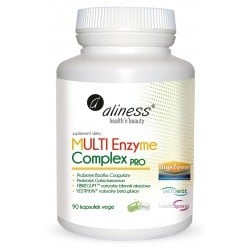
Digestive enzymes are a group of enzymes secreted in the digestive system, mostly hydrolases (hydrolytic enzymes), catalysing the breakdown of more complex compounds into simpler ones (with the participation of water). In all heterotrophs (non-eating organisms), digestion processes are similar and involve the same or very similar groups of enzymes produced by specialized digestive glands. Enzymes participate in virtually every process occurring in our body.
POLPHARMA Debutir (Butyric Acid) 150mg - 60 capsules
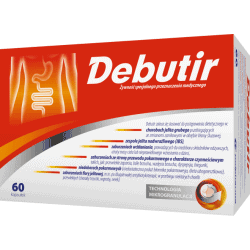
DEBUTIR is a food for special medical purposes in the form of coated capsules containing sodium butyrate in a mixture of acylglycerols (mono-, di- and triacylglycerols). sodium alginate membrane. Thanks to the innovative coating formula, sodium butyrate reaches the large intestine (colon). What elements influence the proper function of the digestive tract?
The proper functioning of the intestines is influenced by elements such as:
*intestinal peristalsis,
*production of appropriate amount of mucus,
*maintained continuity of the epithelium and its ability to quickly regenerate,
*presence of natural bacterial flora in the intestines,
*proper blood supply to the gastrointestinal mucosa
*and a well-functioning local immune system.
THORNE FloraMend Prime Probiotic® (Probiotic - Healthy Gut) 30 vegetarian capsules
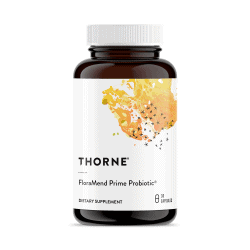
Positive impact on weight management - Increasing evidence shows the positive impact of the gut microbiome on weight management. Research shows that most of the flora in the gut is related to body weight. Human studies with Lactobacillus gasseri have shown an average 4.6 percent reduction in visceral and subcutaneous fat with associated positive effects on body weight, waist circumference, and body mass index.
Strengthens immunity - B. bifidum supports healthy intestinal immunity and helps maintain a favorable balance of flora in the colon. B. longum additionally supports the function of the immune system in the digestive tract and intestinal regularity.
Helps fight seasonal allergies - One probiotic bacterial strain, Lactobacillus gasseri, shows promise in research. A greater presence of L-gasseri in the gut is associated with a healthier immune response, which may be especially beneficial for seasonal allergy sufferers. The highest quality product - FloraMend Prime Probiotic does not contain dairy products, is soy-free and gluten-free. Like all Thorne products, it is made from the highest quality, purest ingredients possible.
Doctor's Best Betaine HCl Pepsin & Gentian Bitters (Betaine HCl) - 120 capsules
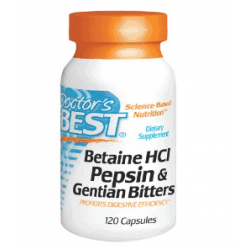
SUPPORTS DIGESTION - Betaine HCl may aid stomach digestion by lowering the pH of the stomach. Pepsin is an enzyme produced by the body to digest protein-containing foods in the stomach. Pepsin works in conjunction with stomach acid to aid in the digestion of protein.
DIGESTIVE ENZYME PRODUCTION - Gentian root has been used extensively by traditional herbalists to support digestive function for years, largely due to water of bitter ingredients. Various traditional texts classify gentian as a bitter tonic and digestive stimulant, due to its ability to promote the secretion of digestive enzymes. It has been shown that fever stimulates the secretion of gastric juice and also stimulates bile.
BACTERIAL FLORA SUPPORT - Ideal production of stomach acid is also essential for maintaining a healthy bacterial balance in the intestines. Acid production in the stomach itself provides a protective barrier that keeps the stomach environment safe. Additionally, adequate levels of stomach acid lead to fewer food fragments remaining, which can cause an imbalance in the growth of normal bacterial flora in the gut.
NOW FOODS Whole Psyllium Husks Powder (Fiber) - 340 grams
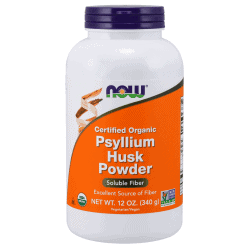
An excellent source of fiber. Soluble fiber from Psyllium Seed Husk, as part of a diet low in saturated fat and cholesterol, may reduce the risk of heart disease. A serving of Whole Psyllium Husks provides the 6-7 grams of soluble fiber needed per day for improved digestion. When used regularly, it prevents digestive system diseases.
Bibliography:
1. Ganong W.F, Physiology, ed. PZWL, Warsaw, 2009
2. Skrautvol K. et al., Tolerance Limits, Self-understanding, and Stress Resilience in Integrative Recovery of Inflammatory Bowel Disease, Holist Nurs Pract. 2017 Jan/Feb;31(1):30-41.
3. Edited by Gajewski P., Internal Medicine – textbook of internal diseases, ed. Practical Medicine, Kraków, 2012
4. P. Nehring, B. Mrozikiewicz-Rakowska, P. Krasnodębski, W. Karnafel, Irritable bowel syndrome - a new look at etiopathogenesis, Przegląd Gastroenterologiczne 2011,
Rate the text

AUTHOR
Patryk Chodyniecki
Patryk Chodyniecki
Patryk Chodyniecki
A enthusiast of bodybuilding, swimming, and martial arts. Has been engaging in amateur strength sports for over 10 years, enjoying alternating between boxing, MMA, and swimming. Also interested in a broad understanding of supplementation and dietetics, which they progressively implement into their training.
A enthusiast of bodybuilding, swimming, and martial arts. Has been engaging in amateur strength sports for over 10 years, enjoying alternating between boxing, MMA, and swimming. Also interested in a broad understanding of supplementation and dietetics, which they progressively implement into their training.
Comments (0)








